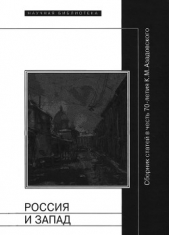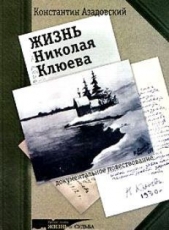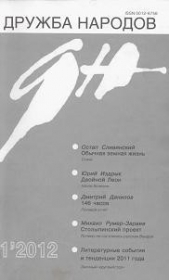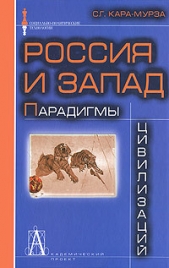Россия и Запад

Россия и Запад читать книгу онлайн
Сборник, посвященный 70-летию одного из виднейших отечественных литературоведов Константина Марковича Азадовского, включает работы сорока авторов из разных стран. Исследователь известен прежде всего трудами о взаимоотношениях русской культуры с другими культурами (в первую очередь германской), и многие статьи в этом сборнике также посвящены сходной проблематике. Вместе с тем сюда вошли и архивные публикации, и теоретические работы, и статьи об общественной деятельности ученого. Завершается книга библиографией трудов К. М. Азадовского.
Внимание! Книга может содержать контент только для совершеннолетних. Для несовершеннолетних чтение данного контента СТРОГО ЗАПРЕЩЕНО! Если в книге присутствует наличие пропаганды ЛГБТ и другого, запрещенного контента - просьба написать на почту [email protected] для удаления материала
Akhmatova reached full poetic maturity in the awful years of the Russian Civil War, especially at the end, when her estranged husband, the poet Nikolai Gumilev, was shot August 1921 as a White counterrevolutionary. In one of her greatest books, «Anno Domini МСМXXI» (first published 1922), Akhmatova adopts the role of the poetic chronicler of her age. The title of this fifth volume of poetry bears a Latin calendar date with numbers written in Roman numerals, linked deliberately to the birth of Christ and acknowledging the dominant nomenclature of the West-em calendar and Western history. One of its finest poems, «Lamentation [Prichitanie]», paraphrases lines from Psalm 29:2, «Bow down to the Lord / In His Holy Court». Here Akhmatova bids farewell to the objects of Russian religious culture, the icons and bells, as well as its figures, the holy fool, the bishops, and Russian saints. The only figure remaining will be the crucial Orthodox Christian archetype of the Mother of God:
In contrast to Mayakovsky’s irreverent, aggressive Christ, Akhmatova describes the Russian saints emerging from their icon covers and returning to their village homes:
The figure of the Mother of God offers a transition to Akhmatova’s ensuing biblical poems that bring alive three Old Testament women characters: «The Mother of God sees them off, / Wraps her son in a scarf, / An old beggar’s one / Dropped by the Lord’s porch» [342]. In «Lamentation» we see that Akhmatova is already moving from her earlier conscribed role as «poet of the private chamber» into the public sphere [343]. This milestone is best captured in «Lot’s Wife», written 1922–1924, in which Akhmatova foregrounds the wife. Lot’s wife is pictured following her husband and an angel away from Sodom, when she starts to feel anxious:
But uneasiness shadowed his wife and spoke to her:
The poet then speaks up for this minor, almost non-existent, Old Testament figure:
«Lot’s Wife» is often read as an allegory for Akhmatova’s sorrow at the loss of her vanished world of St. Petersburg, in which, as she would put it in Requiem, she was the «merry sinner». More importantly, Akhmatova infuses the single famous line from Genesis 19:26 («But his wife looked back from behind him, and she became a pillar of salt») with the pain of losing a beloved and happy home. The poem’s real strength comes from Akhmatova’s complex reading of the lesson of Luke 17:32–33, which derives from the story of Lot’s wife: «Remember Lot’s wife. Whosoever shall seek to save his life shall lose it; and whosoever shall lose his life shall preserve it». As a poet sympathetic to the suffering of Lot’s wife, Akhmatova is at once saving and losing her own life. On one hand, she refuses to «save» herself by leaving Russia — in contrast to Lot and his wife, who did leave Sodom — to live a more secure life abroad. On the other, she insists on mourning the loss of her cultural home in pre-revolutionary St. Petersburg and preserving it in memory in a poem that is now a classic of Russian poetry. It is worth pointing out parenthetically that after 1917 until the 1950s Akhmatova had no actual home of her own but camped out with various friends, spouses, and lovers [345]. In thus «losing» her life, Akhmatova did preserve it in the annals of great poetry.
To convey the impression these poems made on the people who heard them at a time, in which Scripture was forced inexorably into oblivion, we recall the words of the great memoirist and friend to both Akhmatova and Pasternak, Lidiya Chukovskaya The Bible, she wrote in her memoirs, was «dead to me — but Akhmatova’s „Biblical Verses“: „Lot’s Wife“… resurrect the Bible [Bibliiu voskreshaiut]» [346]. In contrast, in 1924, when the poems appeared, the not very approving Formalist critic, Iurii Tynianov wrote that in these poems «the Bible, which used to lie on her table, an accessory to the room, has become the source of her imagery» [347]. In his view, Akhmatova’s poetry thereby became tendentious and flat.
Publishing these poems was a bold move on Akhmatova’s part, a gesture of non-acceptance to a regime that increasingly demanded unerring fealty. It was partly this open animation of biblical figures that made Akhmatova suspect in the eyes of the Bolshevik authorities, an act for which she would be condemned to public silence for nearly two decades. After a 1924 resolution of the Central Committee of the Communist Party not to arrest Akhmatova but also not to publish her, Akhmatova «threw herself into reading, or to be more exact, into the study of the Bible, the ancients, Dante, Shakespeare, French and English poets of the 19th century, and contemporary European and American literature» [348]. Out of this long silence and serious study would come an altered Akhmatova, no longer the «nun who crosses herself as she kisses her beloved» but the moral voice of her people and witness to the horrors of her time [349]. Hers became «people’s poetry» without ever becoming officially accepted, and certainly had much greater truth value because it was never officially accepted [350].
Pasternak’s journey to the status of national poet passed by another route — first embracing the revolution, until he began to reflect on the misfortune sown by the new regime. He shot to fame in 1922 with the appearance of his first book of poems, «My Sister Life». Iurii Tynianov, who had disliked Akhmatova’s biblical poems, hailed Pasternak for giving Russians a new «literary thing»; in these poems, Tynianov wrote, a «downpour starts to be verse» and the «thing comes alive» [351]. Although Pasternak’s would later become a powerful dissenting voice, in part through engaging the perspective offered by the modern Orthodoxy of the Russian religious renaissance and the new biblical themes of Tsvetaeva and Akhmatova, now he was a voice of ecstasy, celebrating the chaotic forces of life.


























